Did Pretty in Pink Originally End With Andie and Duckie Together?
Here is the latest in a series of examinations into urban legends about movies and whether they are true or false. Click here to view an archive of the movie urban legends featured so far.
MOVIE URBAN LEGEND: Pretty in Pink originally ended with Andie and Duckie together.
Pretty in Pink was a 1986 romantic comedy written by John Hughes and directed by Howard Deutch that starred Molly Ringwald, Andrew McCarthy, James Spader and Jon Cryer.
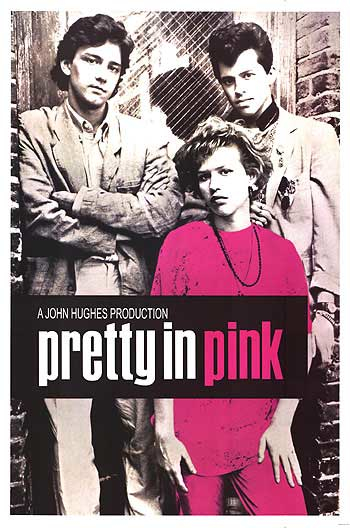
The film centered on Ringwald’s working class Andie and her relationship with McCarthy’s upper class Blaine, countered with her relationship with her best friend, Duckie (played by Cryer).
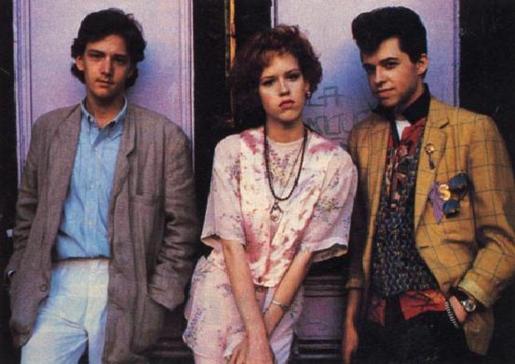
Spader played Blaine’s rich friend, Steff, who pressures Blaine to not date Andie (as it turns out, Steff’s anger is mostly based on Andie spurning his advances earlier in the film). Besides perhaps the soundtrack (and James Spader’s amazing performance as the villainous Steff), the film is best remembered for the best friend who wished he could get the girl, Duckie.
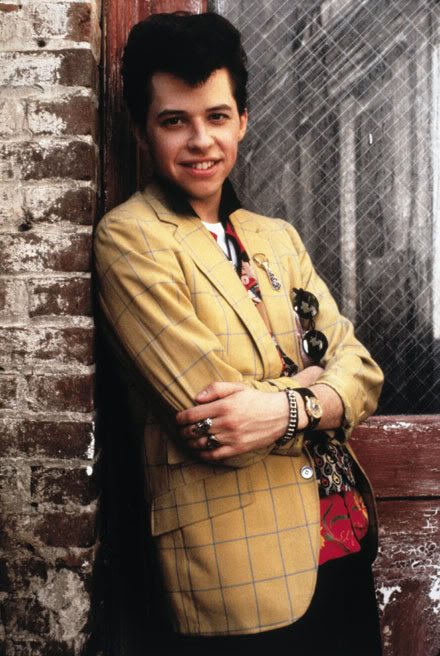
However, while the film ends with Andie and Blaine together, in the original version, Duckie actually did get the girl!
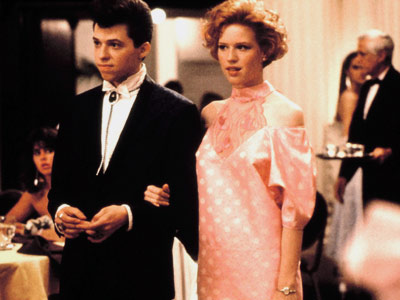
Read on to see why that ending failed and how Robert Downey Jr. actually played a small part in it all…
The original ending of the film is very similar to what we actually saw in the released film. Blaine has chickened out of dating Andie because of Steff’s pressures, so Andie goes to the prom with Duckie. However, in the original script, it ends there with Andie and Duckie together on the dance floor. Steve Spears of the Tampa Bay Times has the original script pages, which ends with:
Andie takes a few steps and starts dancing. Dukie follows clumsily. A few steps and they get in step. They dance without shame or concert for what anybody thinks.
and finally…
ANDIE AND DUCKIE: The [sic] look at each other and smile. Duckie laughs. Andie squeezes him tight and lifts him off his feet.
FREEZE. MUSIC AND TITLES.
They dance to David Bowie’s “Heroes” and the closing music was Orchestral Manoeuvres in the Dark’s song “Goddess of Love.”
This is the ending that actually made it into the novelization of the film by H. B. Gilmour and Randi Reisfield, as obviously they wrote the book based on the original script.
A couple of things, though, were working against Duckie getting the girl.
First off (and most importantly), test audiences were not enamored with the ending. While they did not universally prefer Blaine to Ducky, a clear majority wanted Andie to end up with Blaine instead of Duckie. That, in and of itself, was likely enough to get the ending changed.
However, in addition, Ringwald herself was not a fan of the ending, either. Originally Robert Downey Jr. was in the running to play Duckie and obviously Downey’s take on the character would have been much different, considering that Downey is…how do I put this delicately?….more physically attractive than Cryer (I guess there isn’t a delicate way of saying that). In her excellent book, You Couldn’t Ignore Me if You Tried: The Brat Pack, John Hughes, and Their Impact on a Generation, Susannah Gora interviewed Ringwald on the topic and here is what Ringwald had to say:
“Actually,” Ringwald continues, holding nothing back, “I think he seemed gay. I mean, if they remade the movie now, he would be, like, the gay friend who comes out at the end. He wouldn’t be winking at a blonde [Kristy Swanson], he would be winking at a cute guy…I feel bad saying that I really fought for Robert Downey, Jr.,” Ringwald allows, “because it sort of seems like I don’t appreciate Jon’s performance, which I totally do—it’s just, it really did affect the movie.”
Cryer responded to this during commentary on the 2006 DVD release of Pretty in Pink: Everything’s Duckie Edition (which bizarrely does not include the original ending, just commentary about the original ending).
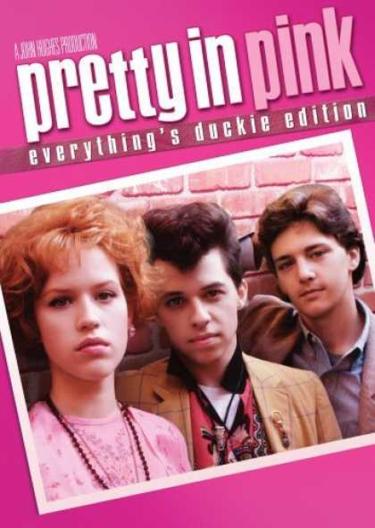
Molly dropped the bomb that she would’ve been fine with the original ending if Robert Downey, Jr., had played Duckie…But since it was me, she just couldn’t see it. It was like, wow, so I’m that unattractive? Thanks, Mol!
Back in 2006, Cryer went into further detail about his feelings about the change in an interview with Entertainment Weekly’s Mandi Bierly:
I was disappointed. You sorta go, ”Oh, guess I’m not the leading man.” But I think it was kind of appropriate. Duckie always thought he was the leading man, and that was his fatal flaw. I got it at the time. I understood that John was trying to do something about crossing class lines and felt that with the ending as it was, it was sort of saying, ”You know what? Class lines aren’t worth crossing.”
That take was echoed by the director of the film, Howard Deutch, who Gora quotes as saying:
“I thought the new ending was heartbreaking. Heartbreaking. I thought it was unfair and wrong, and that’s not what the movie was intended to be. It felt,” he says, searching for the right word, “immoral.”
Immoral or not, the studio was not going to go away from the test audience response, so they filmed a new ending where McCarthy’s Blaine gives a little speech to Andie about how much he screwed up and Duckie tells Andie that Blaine is different and that she should go to him. Amusingly enough, McCarthy was starring in a play at the time about soldiers in Vietnam and thus he had cut off his long hair, so they needed to put him in a wig for the final scene. They did a good job with the wig but you can still see a difference if you look closely.
Blaine before…
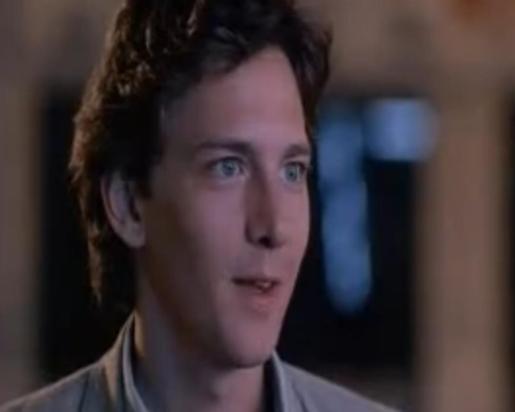
Blaine with wig…
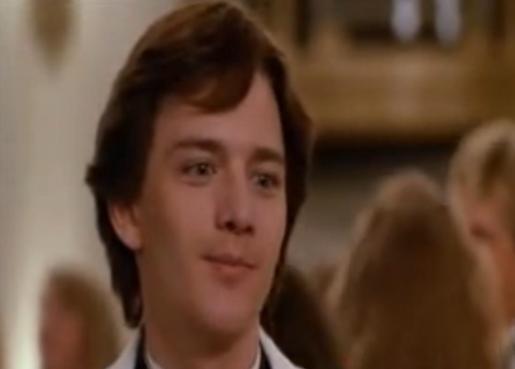
Orchestral Manoeuvres in the Dark had to quickly write a new song for the new ending, and in just a single day they cranked out the instant classic “If You Leave.”
Interestingly, Hughes and Deutch went right back to work on a gender-swapped version of the story in 1987’s Some Kind of Wonderful, with Eric Stoltz in the Ringwald role, Lea Thompson in the McCarthy role and Mary Stuart Masterson in (essentially) the Cryer role.
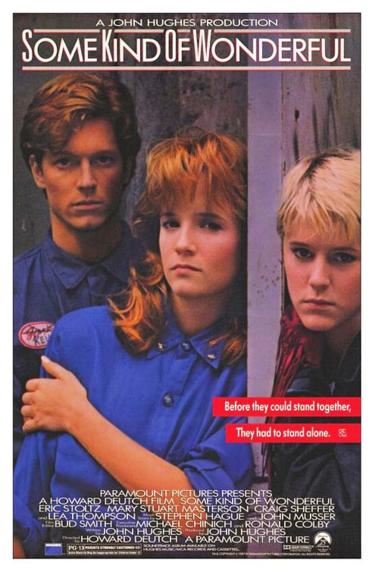
In this film, though, the working class lead eschews the rich girl in favor of his working class best friend.
The legend is…
STATUS: True
Thanks to my good friend Lisa for suggesting that I spotlight this one. Thanks to reader Philip Frey for the novelization information. Thanks to Susannah Gora, Mandi Bierly, Molly Ringwald, Jon Cryer and Howard Deutch for their very informative quotes.
Feel free (heck, I implore you!) to write in with your suggestions for future installments! My e-mail address is bcronin@legendsrevealed.com.
Be sure to check out my Entertainment Urban Legends Revealed for more urban legends about the worlds of TV, Movies and Music!






This is YEARS too late, but “If You Leave” was by one of the other seminal bands of that era, Simple Minds, not OMD.
Never too late, Hal! But “If You Leave” was by OMD. Simple Minds was “Don’t You (Forget About Me),” which actually WAS the song playing in the actual scene (and then dubbed over with “If You Leave” for the actual film). I think that there’s a legend right there. 😉